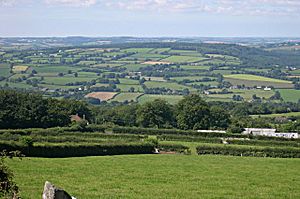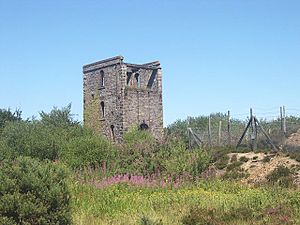Hingston Down facts for kids
Hingston Down is a hill located near Gunnislake in Cornwall, England, United Kingdom. This area was once very famous for its tin mining. Because of all the mining, an old rhyme was created about the hill:
Hingston Down well ywrought
Is worth London Town dearly bought.
This rhyme means that the tin mined from Hingston Down was so valuable it could be worth as much as buying the whole city of London! It shows how important mining was here a long time ago.
It's good to know that there is another place also called Hingston Down. That one is a hill spur about a mile east of Moretonhampstead in the nearby county of Devon. The Hingston Down we are talking about here is the one in Cornwall.
Contents
A Look Back in Time: Hingston Down's History
Hingston Down is believed to be a very important historical site. It is mentioned in an old book called the Anglo-Saxon Chronicle. This book recorded important events from early English history.
The Battle of Hingston Down
The chronicle entry, which scholars have corrected to the year 838, describes a big battle. In this battle, King Egbert of the West Saxons fought against an army. This enemy army was made up of Viking invaders and Cornish people. King Egbert won this battle, which is now known as the Battle of Hingston Down. The old name for the hill, Hengestdūn, means "Stallion Hill."
Exploring Hingston Down's Geology
Hingston Down is not just famous for its history and mining. It's also very interesting for its geology, which is the study of rocks and minerals.
Unique Minerals and Quarry
The old Hingston Down Consols mine on the hill is a special place for geology. It is known as the "type locality" for a mineral called Arthurite. This means that Arthurite was first discovered and identified right here at Hingston Down.
There is also a quarry on the hill. A quarry is a place where rocks and minerals are dug out of the ground. This quarry and the Consols mine together form the Hingston Down Quarry & Consols Site of Special Scientific Interest. This special status means the area is protected because of its unique mineralisation, which refers to the way minerals have formed in the rocks.
 | Selma Burke |
 | Pauline Powell Burns |
 | Frederick J. Brown |
 | Robert Blackburn |



